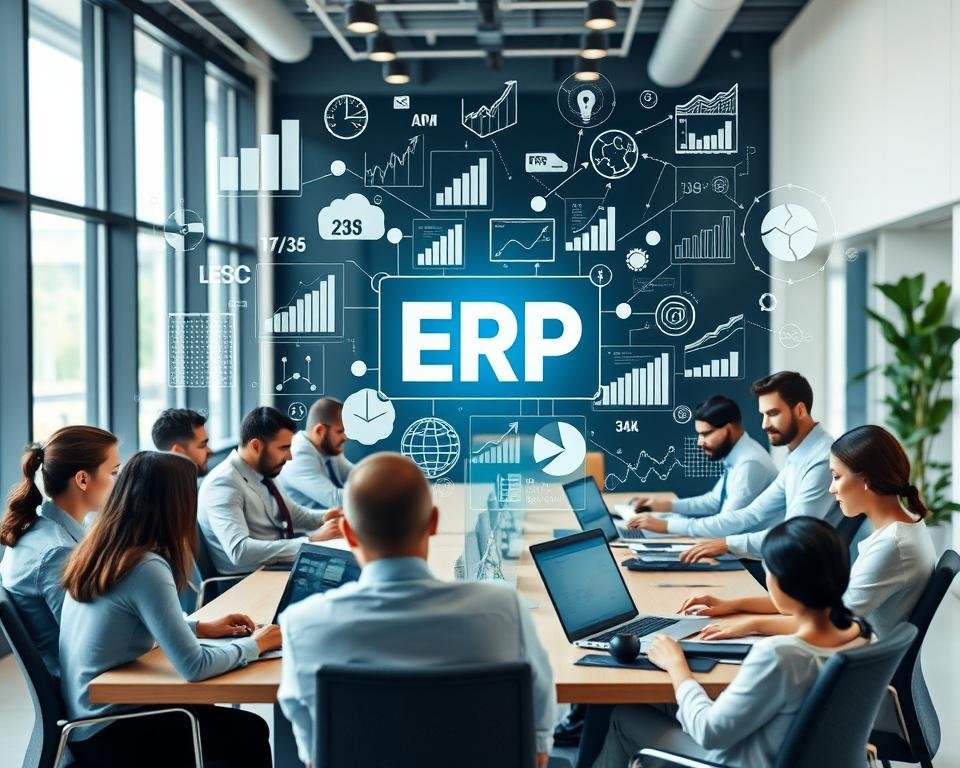In today’s fast-paced business landscape, organizations are constantly seeking ways to enhance their efficiency, productivity, and overall performance. One powerful tool that has emerged as a game-changer is the enterprise resource planning (ERP) system. ERP software offers a comprehensive solution for managing the myriad of tasks and processes that are essential to the smooth running of a business.
At the core of an ERP system is the ability to integrate various business functions, such as accounting, supply chain management, inventory control, and customer relationship management, into a single, centralized platform. By consolidating these critical components, organizations can streamline their operations, improve decision-making, and drive greater profitability.
Key Takeaways
- ERP systems integrate multiple business functions into a single, centralized platform
- ERP solutions enhance efficiency, productivity, and overall business performance
- Streamlined operations and improved decision-making are key benefits of implementing an ERP system
- ERP software can help organizations better manage their accounting, supply chain, inventory, and customer relationships
- Investing in an ERP system can provide a competitive advantage and drive greater profitability
Unveiling the Power of Enterprise Resource Planning ERP System
In the dynamic world of business, organizations are constantly seeking efficient ways to streamline their operations and stay ahead of the competition. This is where enterprise resource planning (ERP) systems come into play, providing a comprehensive and integrated approach to managing various business functions.
What is an ERP System?
An ERP system is a software platform that integrates a company’s core business processes, such as finance, human resources, supply chain management, inventory control, and customer relationship management (CRM), into a single, unified system. By consolidating data and automating workflows, an ERP system enables organizations to improve their business management software, enhance inventory management, and optimize supply chain management.
Key Benefits of Implementing an ERP Solution
Implementing an enterprise resource planning ERP system can unlock a multitude of benefits for businesses, including:
- Improved financial management and accounting software integration
- Enhanced supply chain management and inventory management efficiency
- Streamlined CRM integration and customer service processes
- Real-time data and insights for better decision-making
- Increased productivity and overall business growth
As cloud ERP solutions continue to evolve, businesses can now access these powerful ERP software capabilities through a more flexible and cost-effective integrated management system. This allows organizations to focus on their core operations while leveraging the latest advancements in business management software.

By embracing the transformative power of an ERP solution, businesses can gain a competitive edge, enhance their operational efficiency, and drive sustainable growth in today’s fast-paced business landscape.
Optimizing Business Processes with ERP Software
Integrating an enterprise resource planning (ERP) system can revolutionize how businesses streamline their supply chain management and enhance inventory management efficiency. By leveraging the power of ERP software, organizations can unlock a new level of visibility, automation, and optimization across their entire operations.
Streamlining Supply Chain Management
ERP systems provide a centralized platform that connects all aspects of the supply chain, from procurement and inventory to logistics and distribution. This integrated approach offers real-time visibility into the movement of goods, enabling businesses to make informed decisions and optimize their supply chain processes. With ERP software, companies can:
- Gain end-to-end visibility across the supply chain, reducing the risk of delays and disruptions
- Automate procurement and inventory replenishment, minimizing the need for manual intervention
- Optimize logistics and distribution, ensuring timely delivery and improved customer satisfaction
- Integrate with customer relationship management (CRM) systems to align inventory with customer demand
Enhancing Inventory Management Efficiency
ERP software also plays a critical role in streamlining inventory management processes. By providing real-time data on stock levels, the ERP system can automate reordering and ensure that the right products are available at the right time. This level of inventory optimization can lead to significant cost savings, reduced waste, and increased customer satisfaction.
With ERP-enabled inventory management, businesses can:
- Gain real-time visibility into stock levels and inventory movements
- Automate reordering processes, ensuring timely replenishment
- Integrate with CRM systems to align inventory with customer demand
- Reduce the risk of stockouts and excess inventory, leading to cost savings
By harnessing the power of ERP software, businesses can transform their supply chain and inventory management, unlocking new levels of efficiency, cost savings, and customer satisfaction.
Conclusion
In conclusion, the implementation of an enterprise resource planning (ERP) system can be a transformative step for businesses seeking to streamline their operations, enhance efficiency, and drive sustainable growth. As discussed throughout this article, an ERP solution offers a comprehensive suite of tools and functionalities that enable organizations to optimize their financial management, supply chain processes, and inventory control – all of which are essential for maintaining a competitive edge in today’s dynamic business landscape.
By adopting an ERP system, companies can benefit from improved data integration, real-time visibility into their operations, and seamless cross-departmental collaboration. This, in turn, leads to more informed decision-making, reduced operational costs, and the ability to respond more quickly to market changes and customer demands.
Ultimately, the success of an ERP implementation hinges on selecting the right software that aligns with the unique needs and requirements of the organization. Businesses should carefully evaluate their existing processes, identify areas for improvement, and choose an ERP solution that can address their specific pain points and support their long-term strategic goals. With the right ERP system in place, companies can position themselves for continued growth and success in the years to come.

